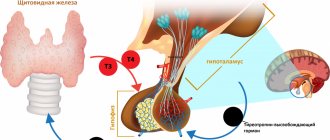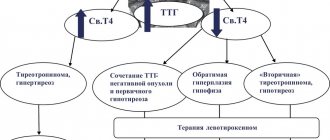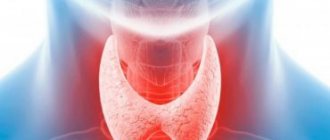Hypoplasia of the thyroid gland, or simply its underdevelopment, can hardly be called a disease. However, this does not have the best effect on the body’s condition, because the underdeveloped thyroid gland does not produce enough hormones necessary for the proper functioning of the entire body. That is why this disorder requires constant monitoring by qualified specialists, and often the patient is prescribed medicinal adjustments of iodine-containing hormones.
Causes of development and types of thyroid hypoplasia
Among the causes that can lead to hypoplasia, the most common are congenital anomalies of the fetus. Hypoplasia can develop due to intrauterine deficiency of iodine or thyroid hormones - for example, if a pregnant woman was diagnosed with hypothyroidism and did not take any medications to correct her condition. The disease can also be triggered by taking hormone-based medications during pregnancy, or exposure to radiation, pathological autoimmune disorders, or serious problems with the central nervous system.
Hypoplasia can occur in women even in adulthood. The reason for this may be:
- lack of iodine;
- uncontrolled use of drugs based on hormones that affect the functioning of the thyroid gland;
- changes in the autoimmune plan associated with the appearance of neoplasms;
- improper action of the hypothalamic-pituitary system;
- bad heredity;
- influence of radiation;
- alcoholism.
The following types of hypoplasia can be distinguished:
- Aplasia is when the thyroid gland is completely absent from birth.
- Diffuse hypoplasia – when the shape of the gland is preserved, but its size is uniformly increased.
- Reflection on the right or left lobe - when changes affect only part of the thyroid gland.
There are also three stages of the disease, the first of which is characterized by mild symptoms, the second by noticeably manifested symptoms and a decrease in the size of the thyroid gland, and the third is characterized by irreversible atrophy of glandular tissue and severe symptoms of hypothyroidism.
Characteristic manifestations of pathology
In the presence of hypoplasia, patients complain of:
- increased nervousness and weakness;
- weight gain not motivated by other signs;
- the appearance of edema;
- memory impairment;
- hard stool (constipation);
- decrease in pressure;
- violation of facial expressions.
If the disease progresses, myxedema may develop - a condition in which facial features are smoothed due to swelling of fatty tissues, the condition of the skin worsens, and it becomes difficult to breathe due to swelling of the mucous membranes. It is possible that the size of the heart may increase due to fluid accumulation in the pericardium.
In newborns, the disease is determined by the following symptoms:
- breast refusal;
- lethargy and poor response to stimuli;
- presence of newborn jaundice;
- hoarse voice;
- developmental and growth retardation.
To determine the type of hypoplasia and identify the need for drug correction, a patient who has complaints similar to the anamnesis will need to consult an endocrinologist in Krasnodar.
Diagnosis confirmation
Symptoms of hypoplasia are also characteristic of other diseases, so additional examinations will be required to clarify the diagnosis:
- Analysis of the gland body by palpation.
- Ultrasound examination of the thyroid gland.
- Blood test to determine the level of the main hormones that are created in the thyroid gland.
- Scintigraphy.
Visual signs of thyroid disorders
Excess weight does not go away even on a diet? Do you want to sleep even after 9 hours of full sleep? Have apathy and irritability become the daily “norm”? Have skin, hair and nails long ago ceased to be a reason for pride? Then this article is for you.
Big Boss Metabolism
Many already know that this small, butterfly-like organ is the big “boss” in the body, and it is in charge of all metabolic, “construction” and restoration processes.
However, the thyroid gland does not make all “decisions” on its own, because its work is controlled by another “boss” - the pituitary gland. If the hormones of the gland (T4 and T3 free) become low, the pituitary gland “writes a fine” (TSH), which encourages the gland to work harder. This condition is called hypothyroidism.
If the thyroid gland “overdoes” with the release of hormones, TSH, on the contrary, decreases so as not to “inadvertently” increase the excessive production of T4 and T3. And this pathology is called hyperthyroidism.
It also happens that the pituitary gland “for no reason” authorizes the thyroid gland. In this case, both T4 and T3 and TSH increase in the blood. And the pathology is most often associated with brain oncology.
Fortunately, there are not many reasons for “thyroid” malfunctions. And in most cases the disease is caused by:
- iodine deficiency,
- autoimmune aggression,
- neoplasms (tumors, cysts)
- or radiation.
And the most common are the first two factors.
Visual signs of violations
“Thyroid” diseases, in most cases, are reflected literally on the face. Therefore, if you pay close attention to your health, it is quite difficult not to notice them.
So, hypothyroidism (hormone deficiency) is characterized by:
- increased fatigue, fatigue, drowsiness, even after a quality 9-hour sleep;
- depressed mood, depression,
- excess weight resistant to diet and exercise,
- swelling of the body and puffiness of the face,
- dryness, inflammation and poor healing of the skin,
- fragility and hair loss,
- low blood pressure, dizziness,
- digestive disorders, constipation.
And for excess hormones:
- excessive excitability, insomnia,
- anxiety, aggressiveness, panic attacks,
- unmotivated weight loss, exhaustion,
- excess oily skin and hair,
- increased sweating,
- high blood pressure, palpitations,
- headache,
- abdominal pain (due to cramps), constipation or diarrhea.
Symptoms can occur in different combinations, and their intensity depends on the degree of disturbance. Among other things, it is important to remember that symptoms can increase gradually over several years. And they do not go away even after harmonizing nutrition, rest and physical activity.
How to check
Basic complex:
- T4 and T3 free,
- TSH,
- antibodies to TPO and TG (risk of hypothyroidism) – to assess the risk of developing or already existing degree of autoimmune aggression
+ Ultrasound.
Expanded complex:
- T4 and T3 are free,
- TSH,
- antibodies to TPO and TG + antibodies to TSH receptors (risk of hyperthyroidism),
- as well as thyroglobulin and calcitonin (thyroid tumor markers)
+ Ultrasound.
Congenital hypothyroidism
The thyroid gland is formed in the baby already at 4-5 weeks of intrauterine development. And its formation is greatly influenced by the mother’s diet and, most importantly, by her sufficient consumption of iodine during pregnancy.
Lack of iodine during prenatal development and early childhood can lead to serious pathologies of the thyroid gland and problems with the intellectual and physical development of the child in the future.
The development of hypothyroidism (decreased thyroid function) in the prenatal and neonatal periods can lead to an irreversible decrease in the mental development of the child. Against the background of iodine deficiency, endemic goiter and hypothyroidism, disturbances in the formation of the child’s brain can occur, manifesting themselves in a wide range - from mild decrease in intelligence to severe forms of endemic cretinism. It should be noted that in some cases, these deviations in the health of children, not detected during the neonatal period, do not appear immediately, but during puberty. In this case, various manifestations are possible: a decrease in the reproduction of auditory information, deterioration in visual memory, other mental activity, as well as the adaptive capabilities of the central nervous system. Moreover, it was found that against the background of chronic iodine deficiency, 30–60% of children have behavioral and emotional abnormalities, and disturbances in personality formation are noted. Studies conducted around the world have demonstrated that the average IQ in regions with severe iodine deficiency is 15–20% lower than in areas without such deficiency.
The causes of congenital hypothyroidism in children are:
- maternal hypothyroidism
- genetic predisposition
- decreased sensitivity to thyroid hormones
You can suspect hypothyroidism in a newborn based on the following symptoms:
- birth weight more than 4 kg
- prolonged jaundice, swelling
- dryness, flaking of skin
- blueness in the nose area
- chronic constipation
In the maternity hospital, a test for congenital hypothyroidism is required. To do this, blood is taken from the newborn's heel and the TSH level is determined. Do not refuse to carry out this analysis, because with congenital hypothyroidism it is very important to start treatment as early as possible! With timely treatment, it is possible to compensate for all disorders without developing any complications.
Thyroidosycosis
An endocrine disease caused by the thyroid gland producing an increased amount of hormones. It occurs much more often in girls than in boys. Most often, thyrotoxicosis develops in children after certain diseases: tonsillitis, influenza, scarlet fever, diphtheria, rheumatism, tuberculosis, etc. In addition, changes in the functioning of the thyroid gland can occur as a result of allergies.
Symptoms of thyrotoxicosis in children:
- enlargement of the thyroid gland (often this can only be determined by a doctor)
- change in the shape of the eyes, they appear large and protruding from their sockets
- white strip of sclera between the upper edge of the iris and the upper eyelid
- tachycardia, heart murmur
- increased nervousness, irritability, aggressiveness
- sleep disorders
- weight loss
- disorders of sexual development
If you notice the above symptoms in your child, do not delay - consult a doctor! This will help avoid serious violations of the child’s mental and physical development.
Acquired hypothyroidism
Unfortunately, hypothyroidism is not only congenital, but also acquired. It can develop when the formation of hormones in the thyroid gland is disrupted. The causes of hypothyroidism are:
- some diseases
- removal of the thyroid gland
- iodine deficiency
Very often there is a certain hereditary predisposition, i.e. certain thyroid diseases in close relatives, especially the mother. It is advisable to examine such children even without clinical manifestations of pathology.
Causes of congenital hypothyroidism
The causes of hypothyroidism in newborns can be varied. The disease itself develops due to abnormal development of the thyroid gland. Such an anomaly may be abnormal intrauterine development of the fetal organs: the thyroid gland may develop in the space behind the sternum or in the sublingual space, in addition, the tissues of the organ itself may be underdeveloped or completely absent.
The disease can also be caused by unfavorable factors affecting a woman during pregnancy:
- poor nutrition (lack of vitamins and minerals, important nutrients for the thyroid gland iodine and selenium);
- infectious diseases;
- autoimmune diseases;
- intoxication of the body;
- abuse of various medications;
- being in a radioactive irradiation zone.
According to statistics, hypothyroidism is a genetically determined pathology in only 2% of newborns.
Treatment methods for hypothyroidism in children
In almost all cases, a child with a diagnosis is prescribed drug therapy, which consists of constantly taking medications with synthetic thyroid hormones. For each patient, the drug and its dosage are selected individually, depending on their specific blood tests. Replacement therapy allows a child to live a full life, develop physically and mentally on an equal basis with his peers.
The effect of correctly prescribed treatment is felt within a week, and how long the child will need to maintain hormone levels with the help of medications depends on many factors.
In some cases, therapy will be short-term, that is, after normalization of hormonal levels, the drugs can be completely discontinued and the body will begin to cope on its own; in other cases, lifelong medication will be necessary. In any case, the thyroid gland will need to be checked annually to prevent relapse or worsening of the condition.







